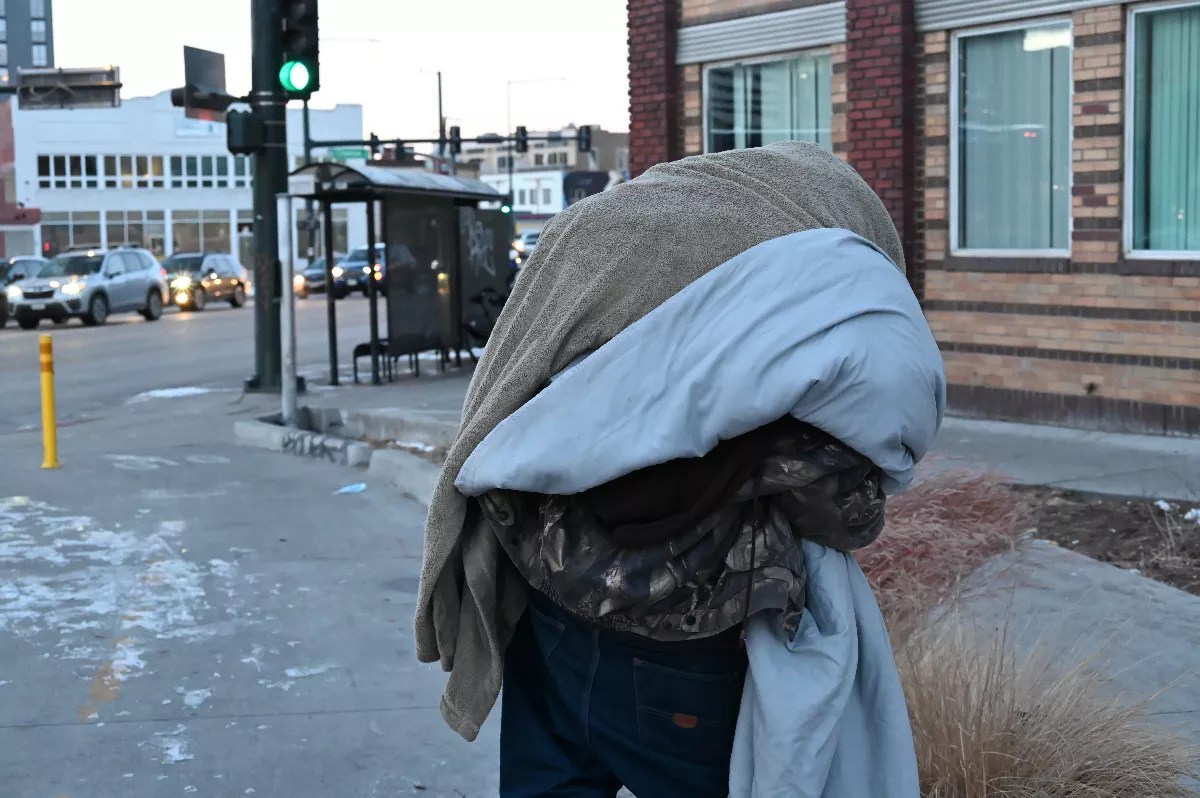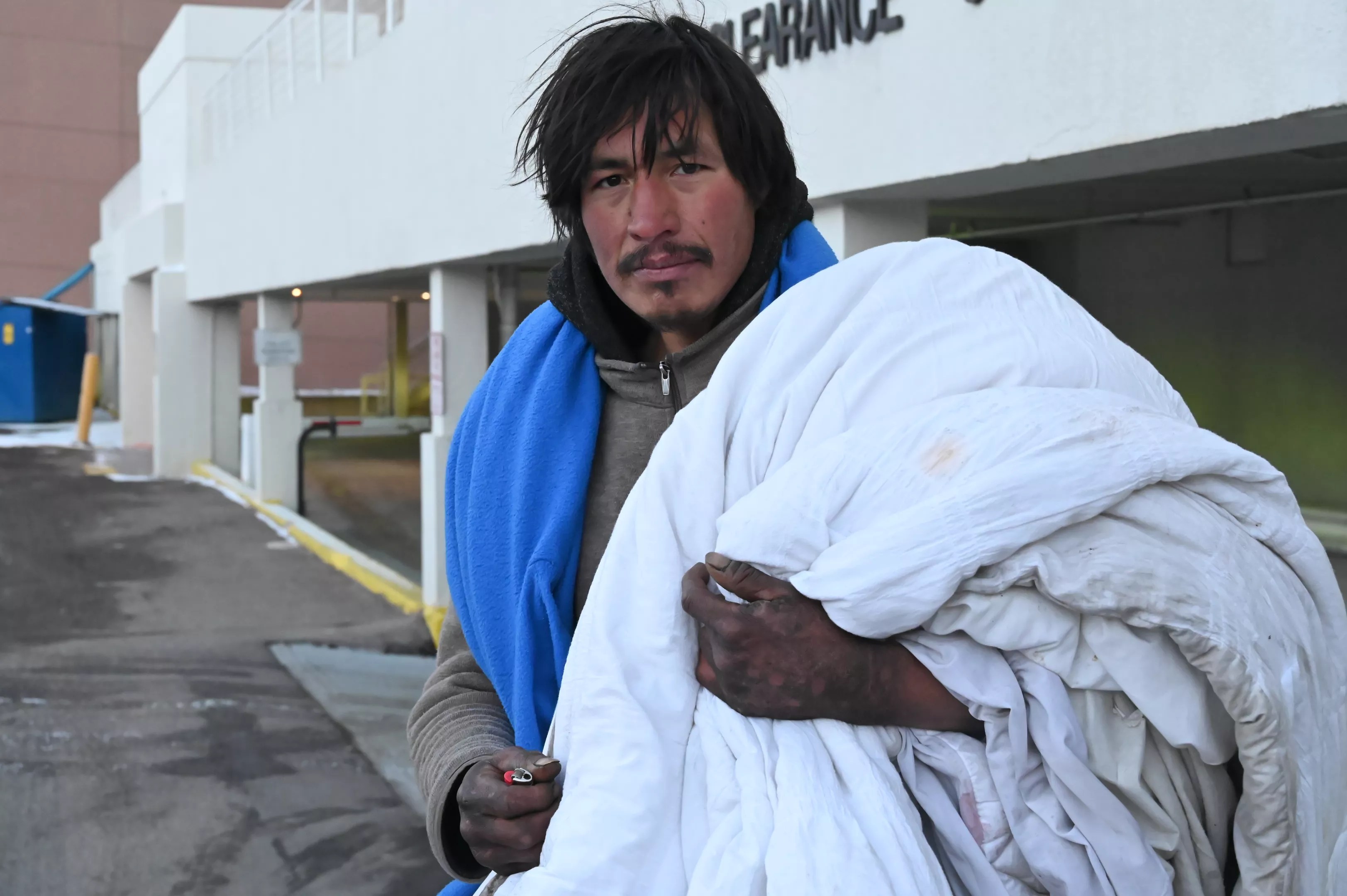
Bennito L. Kelty

Audio By Carbonatix
The sun is out, the roads are clear, the snow is melting and the temperature has climbed back up to 40 and even 50 degrees. With the warmer weather comes an end to the city’s first cold-weather shelter activation of the year, which lasted fifteen consecutive days and expired on Saturday, January 20.
During that stretch, Denver housed about 3,200 people in its regular and emergency shelters; without the cold-weather shelter activation, the city’s standard shelter capacity is 2,600.
But the city is dealing with a migrant crisis, too, and during the cold snap Denver took more than 300 migrants into overnight shelters, bringing the number of migrants in city shelters to just under 5,000 for a brief period. Currently, about 4,300 migrants are staying in additional Denver shelters.
Kim Miller, an activist with Mutual Aid Monday, and Terese Howard, the lead organizer for Housekeys Action Network Denver, both worked through the cold stretch to get people indoors. Homeless individuals, including migrants, were “grateful for the space,” Howard says, but the two advocates have ideas for how the city can improve its response next time.
“The city has done more to bring unhoused folks out of the cold,” Miller says. “But what still needs to be done is more access to 24-hour shelters, more days where they do that and no freezing sweeps, and getting more people off the streets.”
Denver lays out its criteria for emergency shelters in the Cold Weather Shelter Plan
. In order to activate these cold-weather shelters, all other shelters have to be full, and one of three other conditions must be met: temperatures below 20 degrees; a windchill advisory, watch or warning; or two or more inches of snow in the forecast.
The city activated the overnight emergency shelters on January 5, ahead of a frigid two weeks that saw temperatures drop as low as 19-below at the airport. Two spots were activated to take in people from 7 p.m. to 7 a.m.: the Denver Navigation Campus, in the former Doubletree Hotel at 4040 Quebec Street, and the New Directions shelter, which is a former Best Western at 4595 Quebec Street. To reach those facilities in the Central Park and Northeast Park Hill neighborhoods, individuals had to catch a bus at “front door shelters,” as the city calls them.
Howard says these emergency shelters are “out in bumfuck nowhere.” Day shelters like the St. Francis Center and the Lawrence Street Community Center, which are also front-door shelters, are much closer to downtown, but they only offer refuge from the cold until 8 p.m. at the latest, and no place to sleep at night.

Benjamin Yankton was looking for somewhere to sleep as temperatures dropped.
Bennito L. Kelty
People using the overnight shelters have to leave at 7 a.m. and find another place to stay warm. Miller is concerned that busing people to these shelters is “a lot of back-and-forth; people worry about their belongings,” she says. “It’s really hard on people, moving around morning and night.”
They want the city to set up a cold-weather shelter closer to downtown, where more people are homeless. The city previously used the McNichols Building, at 144 West Colfax, for an emergency shelter, but it’s currently being used as a migrant shelter.
“We obviously also support them using it for migrants. The city is overwhelmed,” Miller says. “But last winter the city did open the McNichols Building, and that was pretty successful, because that’s pretty easy for people to get to, and it’s close to transit.”
The city will extend the hours of operation for cold-weather shelters to 24 hours under “extenuating circumstances,” such as sub-zero temperatures or a blizzard. The city offered four days of around-the-clock cold weather shelters this month, starting on January 12, because of “dangerously cold weather setting in,” according to the city.
Such 24-hour shelters should be the norm, “not the exception,” Miller says. “During cold-weather activation, 24/7 makes it so much easier on people. It causes less harm, less risk of frostbite. Especially when we’re talking about people with disabilities; it’s not easy for them to bounce back and forth.”
The city changed its rules for cold-weather shelter activation last year. Before then, activation would occur when the overnight forecast was 10 degrees or lower (during a very cold January 2022, the 24-hour shelters were open for fifteen consecutive days). But in 2023, the city changed the threshold to 20 degrees. Denver officials chose that temperature because it’s the average overnight winter low in Denver; about half of the nights between December and March will drop to this level.
This threshold isn’t low enough for some, though, including at-large Denver City Councilmember Sarah Parady; she wants it raised to 32 degrees. According to Josh Barocas, a medical researcher from the University of Colorado who spoke to a council committee in November, temperatures below that can cause bodily harm to people sleeping outside.

Terese Howard, the lead organizer for Housekeys Action Network Denver, at a No Freezing Sweeps rally in front of City Hall on January 16.
Bennito L. Kelty
Parady is also spearheading the No Freezing Sweeps bill, a proposal that would prohibit city agencies like the Denver Police Department and Department of Transportation & Infrastructure from removing tents or encampments when the weather is below 32 degrees. Denver City Council will vote on that proposed ordinance at its next meeting.
HAND has been pushing that proposal for more than a year. “We wrote it,” Howard says. “It’s our baby.” Homeless individuals are worried about losing their belongings, she says, and that argues for ending sweeps and also opening 24-hour shelters.
“One significant reason people don’t go into warming centers is because of fear that their stuff is going to be taken once they go in,” Howard says. “We’re heard stories of people that were in a shelter trying to get warm, and meanwhile the cops came and took all their stuff, or they were outside, the cops came to sweep and offer them a hotel, and when they go to the hotel, all their stuff was gone.”
HAND called out the city for carrying out a freezing sweep as recently as January 19, when Denver Parks & Recreation cleared out a migrant encampment near the intersection of East 51st Avenue and Emerson Street.
“Park rules do not allow individuals to set up tents or structures of any kind, so as to ensure that public parks remain open for all,” says Yolanda Quesada, the department’s spokesperson. About a dozen migrants were staying in the park, according to HAND; Quesada says two were moved into shelter.
“The city jumped on the fact that the No Freezing Sweeps bill was postponed two weeks to conduct this sweep in spite of it being between 24 and 30 degrees,” reads a HAND announcement. “This is exactly what we worried would happen if the bill was postponed.”
Mayor Mike Johnston opposes the bill because it “would effectively repeal the camping ban for a third of the year, or approximately 120 days a year, which would be contrary to the will of Denver voters,” wrote Angela Casias, the mayor’s legislative director, in a January 6 email to Denver City Council.
“The ordinance language limits our ability to bring people indoors when conditions are dire,” Casias’s memo continued. “Denver’s agencies require flexibility to respond to emergent situations and the ability to take action to prevent dangerous conditions in encampments.”
After receiving that email, on January 8 councilmembers amended the bill to give city agencies room to continue offering shelter on below-freezing days and to sweep on days when the weather hasn’t yet dropped below 32 degrees. The next week, they postponed the final vote to January 29.
Even with those amendments, Casias’s original statement reflects Johnston’s position, according to Jose Salas, a spokesperson for the mayor’s office.
“The bill is still strong,” Howard says. “It has what’s needed to really stop freezing sweeps. We can live with some amendments.”
Miller agrees that the ordinance “would be a tremendous improvement. It would be a commitment to avoiding the cruelty that’s involved in sweeps.”
HAND is planning a rally to support the No Freezing Sweeps bill on Monday, January 29, in front of City Hall before the Denver City Council meeting begins at 3:30 p.m. Mutual Aid Monday is at City Hall from 4 to 7 p.m. every Monday to offer free meals, clothes and services such as haircuts.
The weather is supposed to be sunny next Monday, with a high near 60 degrees.